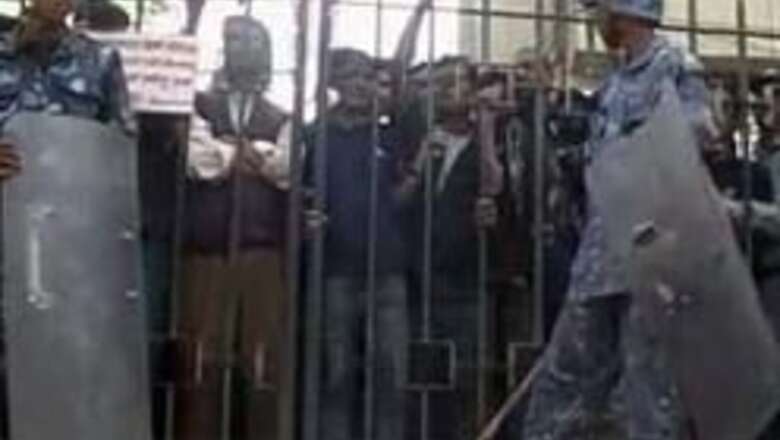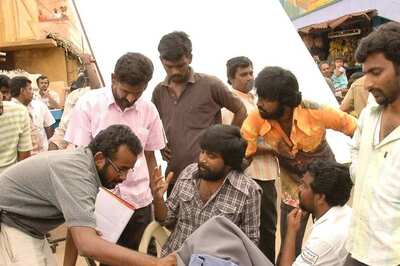
views
Kathmandu (Nepal): With defiance of royal rule spreading, security forces fatally shot a protester on Monday even as King Gyanendra searched for a way out of a crisis that has plunged the Himalayan land into its worst turmoil since he seized absolute power 14 months ago.
Twelve days of often-bloody pro-democracy protests and a general strike have emptied Nepal's highways, leaving cities short of fresh food and fuel.
As darkness fell on the capital, thousands of protesters again rampaged on Katmandu's outskirts, blocking roads with burning barricades and hurling bricks at police.
Officers responded with tear gas, rubber bullets and baton charges.
The anti-royalist sentiment was as thick as the smoke. "We will hang Gyanendra over flames. The king will burn!" Arjun Prasad, 22, declared as he stood near a flaming pile of tires.
In Nijgadh, 75 miles south of Kathmandu, thousands of people were marching through town when security forces opened fire with live ammunition, killing one protester and wounding five, a local official said.
The death was the fifth caused by security forces in recent days.
The five wounded protesters were hospitalized with serious injuries, said the official, who spoke on condition of anonymity because he was not authorized to talk to reporters.
Since the opposition campaign began April 6, daily protests have hit nearly every city and town in this Hindu mountain kingdom.
Ordinary Nepalis have joined the rallies alongside the usual cast of students and political activists.
Lawyers, doctors and even the disabled have organized their own demonstrations.
The king appeared to be seriously considering relinquishing at least some of the power he seized when he closed Parliament in February 2005, a move he said was needed to restore order and crush a communist insurgency that has killed nearly 13,000 people over the past decade.
A palace official said Gyanendra met on Monday with two former prime ministers - Krishna Prasad Bhattarai and Suraya Bahadur Thapa - to explore the possibility of appointing a prime minister.
"The king is looking for a way to solve the current crisis. It may not necessarily be Bhattarai or Thapa but it would be someone to work with to tide over all this," said the official, on condition of anonymity.
Bhattarai, an 82-year-old former leader of the Nepali Congress, which is one of the seven political parties organizing the democracy protests, declined to discuss what was talked about at the meeting. "There will be changes," was all he said.
The opposition parties said there would be no compromise.
They are demanding a new constitution that would limit or even eliminate, the monarchy's role.
"We have not been asked by the palace, and even if we are called for the meeting we will not go," said Krishna Sitaula of the Nepali Congress, the country's largest party.
While many of Nepal's 27 million people at first welcomed the king's power grab - fed up with the corrupt and squabbling political elite - the worsening communist insurgency and a faltering economy have fueled discontent.
Sunday saw upward of 50,000 people march in spots across Nepal, and tens of thousands were back in the streets Monday, many chanting for the monarch to be ousted or killed, a sentiment once unheard in a land where monarchs have been revered for generations as Hindu god-kings.
In Kathmandu's backpacker hub, Thamel, protesters were out Monday for a second straight day.
Police fired tear gas and beat hotel and restaurant workers as tourists watched.
"There is increasing defiance, there are more and more people coming to participate," said Editor of the news magazine Samay, Yubaraj Ghimire.
The government's tenuous hold over the country was made clear Monday when officials offered truckers nearly $50 - a hefty sum in this poor country - to break the strike and haul food to the cities.
Many drivers fear reprisals from protesting youths or the rebels, who are backing the political parties' campaign.
Prices for the few vegetables in Kathmandu's markets have risen fivefold. Chicken and mutton prices have doubled.



















Comments
0 comment